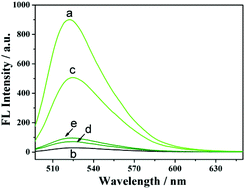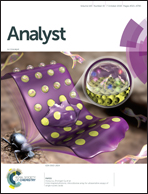A peptide–WS2 nanosheet based biosensing platform for determination of β-secretase and screening of its inhibitors†
Abstract
β-Secretase (BACE1) is an important drug target in the treatment of Alzheimer's disease (AD). Therefore, sensitive detection of BACE1 is essential for AD treatment and drug discovery. In this work, a facile and sensitive fluorescence biosensing platform was developed for BACE1 detection. This sensing platform was constituted based on the interaction between a WS2 nanosheet and a peptide sequence. In the absence of BACE1, a FAM-labeled peptide substrate could be adsorbed on the surface of the WS2 nanosheet, thereby quenching its fluorescence. However, in the presence of BACE1, the hydrolysis of the peptide substrate by BACE1 triggers could occur with the subsequent release of short FAM-linked peptide fragments which could not be adsorbed on the surface of the WS2 nanosheet. This resulted in weak fluorescence quenching, thus restoring the fluorescence signal. By measuring the change in the fluorescence of the FAM-labeled peptide substrate, the fluorescence sensing platform based on the WS2 nanosheet could monitor BACE1. The proposed WS2 nanosheet-based platform exhibited excellent specificity and high sensitivity with a detection limit of 66 pM for BACE1. Importantly, we also demonstrated that this platform was suitable for the screening of BACE1 inhibitors. The proposed sensing platform not only provides a novel strategy for the BACE1 assay but also offers a potential tool for screening drugs.



 Please wait while we load your content...
Please wait while we load your content...